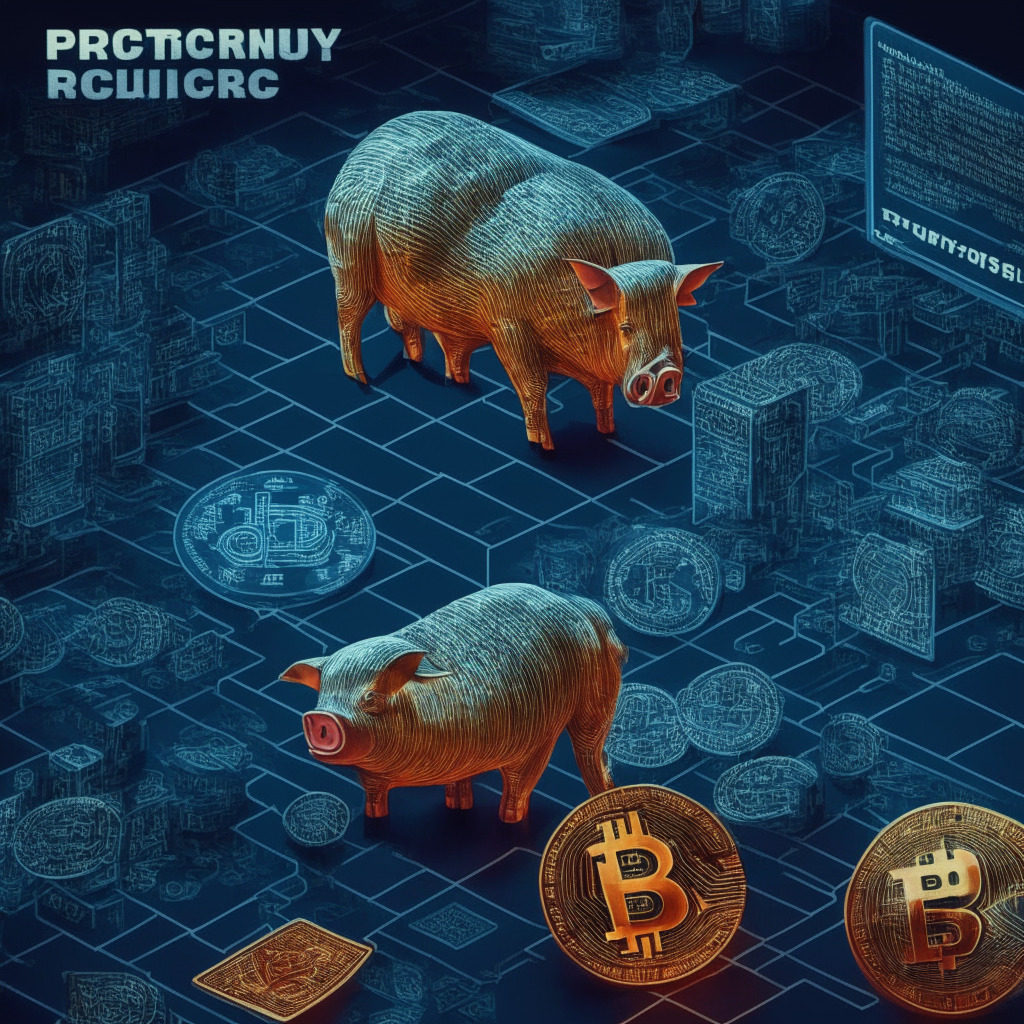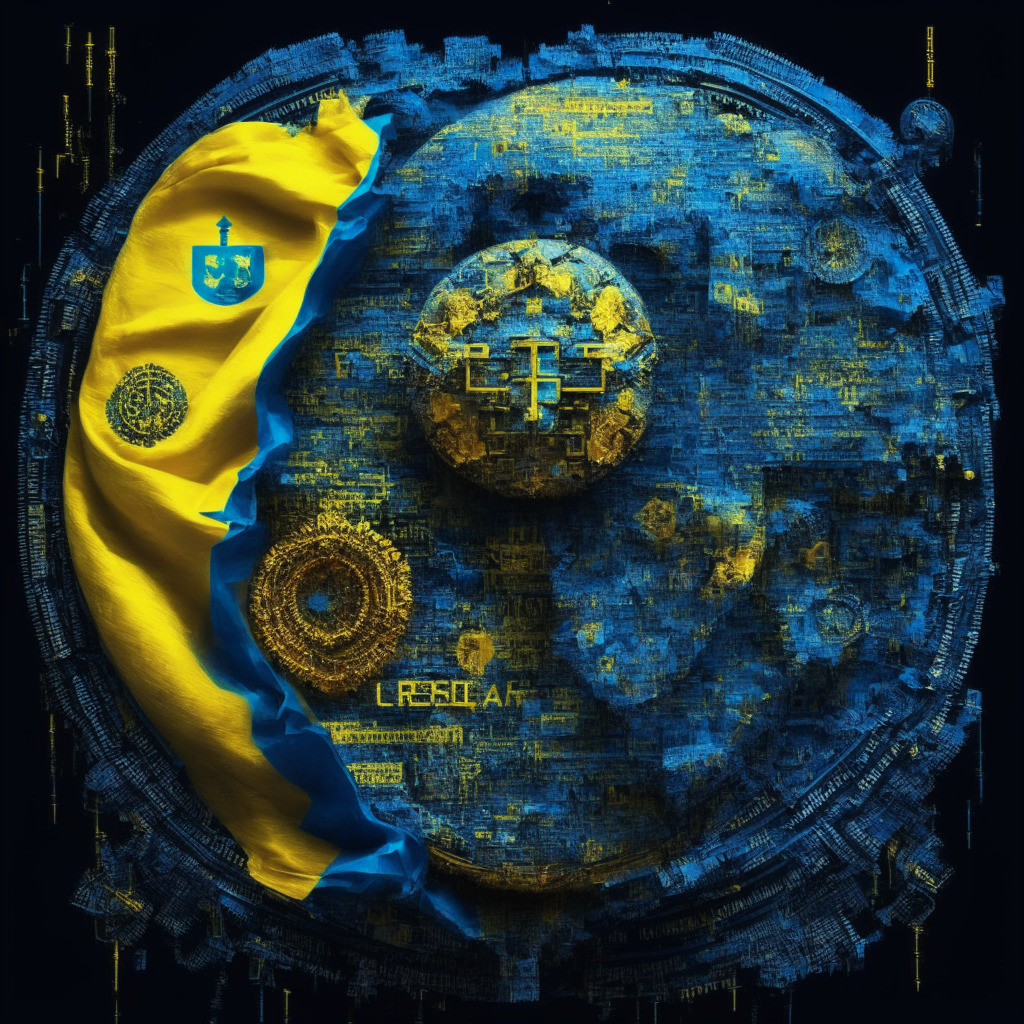Over 100,000 login credentials for OpenAI’s ChatGPT were found on the dark web, stolen by the Raccoon Infostealer malware via phishing emails. Cybersecurity firm Group-IB warns of the simplicity and effectiveness of such info stealers, while emphasizing the importance of employing security measures and staying informed about potential threats.
Search Results for: chainalysis
Emerging Darknet Task Force: Unveiling Future of Crypto Regulation and Criminal Adaptation
The “Darknet Marketplace and Digital Currency Crimes Task Force” showcases the growing concern related to digital currencies in crime. This task force, consisting of agents from various federal agencies, seeks to dismantle criminal organizations taking advantage of digital currencies’ anonymity and raises questions about the future of cryptocurrencies and the increasing need for regulatory measures.
Institutional Staking Boom: Balancing Innovation and Compliance
Cryptocurrency staking platform Northstake raised $3 million in funding, showcasing interest in the institutional staking market. With over $80 million in crypto assets staked in 2022, the company focuses on regulation-compliant “vanilla staking products” to minimize anti-money laundering risks. Experts predict a promising future for financial institutions gaining exposure to staking cryptocurrency.
Atomic Wallet Hack: Uncovering Causes, Tracking Funds, and Strengthening Security
Atomic Wallet recently disclosed new details about its June 3 hack, affecting less than 0.1% of its users. The company is working to recover lost funds and collaborating with exchanges and blockchain analysis firms Chainalysis and Crystal. While the total amount stolen remains undisclosed, Elliptic reported a figure of over $100 million, with possible links to the North Korean hacking group Lazarus.
Expanding Crypto Trading on Tel Aviv Stock Exchange: Pros, Cons, and Global Regulation Debate
The Tel Aviv Stock Exchange plans to allow nonbanking member customers to trade cryptoassets, expanding authorized activities. Meanwhile, the IMF and FSB aim to develop a coordinated global crypto regulation approach. In other news, private investment firm ABO Digital launched, supporting the digital asset space, and Push Protocol revealed a group chat feature for its Web3 messaging app.
DeFi Bounties: Encouraging Hackers or Protecting Funds? The Sturdy Finance Dilemma
Sturdy Finance reopens stablecoin market after an $800,000 exploit, offering a $100,000 bounty for the attacker’s assistance in recovering funds. The incident sparks debate on whether bounties deter malicious actors or attract potential attackers, while hackers develop tactics to hide stolen funds.
MiCA Regulation Impact: Preparing Crypto Firms for Compliance and Global Expansion
The upcoming Markets in Crypto Assets (MiCA) regulation in the EU urges cryptocurrency companies to prepare for compliance. Although not effective until 2024, securing licenses and aligning with new rules requires substantial time and effort, with benefits including cross-EU operational capabilities and potential global standardization.
The Struggle for Crypto Regulation: Balancing Market Growth and Consumer Protection
In the world of digital assets, regulation is crucial to protect consumers and markets. A holistic regulatory framework, consisting of prudential regulatory requirements, market conduct regulation, and financial integrity and consumer protection, is necessary for the U.S. to remain competitive and foster safe growth in the digital asset market. Clear guidelines can help protect consumers and stimulate investment in this rapidly growing sector.
Ripple Partners with Colombian Central Bank for CBDC Pilot: Exploring Benefits and Challenges
Ripple partners with Colombia’s central bank and MinTIC to experiment with central bank digital currency (CBDC) technology using Ripple’s CBDC platform. This pilot aims to enhance Colombia’s high-value payment system but doesn’t confirm the country’s intention to launch a CBDC.
Crypto Mining as Money Laundering Tool: Risks and Solutions for a Safer Ecosystem
The Lazarus Group, a North Korean hacking group, has been found using stolen cryptocurrencies to mine “clean” coins and launder them through hashing rental and cloud mining services. Blockchain forensic firm Chainalysis reports a rise in ransomware wallets sending funds to mining pools, possibly for money laundering purposes. Ensuring mining pools and hashing services implement rigorous wallet screening, including KYC protocols, could help prevent exploitation of mining for money laundering.
FPG Cyber-Attack: Decentralized Finance Security Debate Intensifies Amidst Stolen Assets
The crypto community is concerned about safety and security after a cyber-attack on Floating Point Group (FPG) resulted in a loss of $15 to $20 million, suspending withdrawals, deposits, and trading. The company is working diligently to recover assets and cooperate with law enforcement and agencies like the FBI and DHS. This incident highlights the need for stronger security measures in decentralized finance platforms.
FPG Cyberattack: A Wake-Up Call on Cryptocurrency Security and Audits
The recent cyberattack on Floating Point Group, resulting in a loss of $15-$20 million in crypto, raises concerns regarding the effectiveness of current security measures, certifications, and audits in protecting digital assets. As the industry evolves, collaboration and comprehensive security strategies are crucial to address the ever-present challenges of securing cryptocurrencies.
Crypto Heist Shocks Community: Atomic Wallet Loses $100M – How to Safeguard your Assets
Atomic Wallet faced a cyberattack resulting in over $100 million in losses, affecting 5,500 crypto wallets. Blockchain analysis company Elliptic attributed the theft to the Lazarus Group and highlighted the crucial need for enhanced security measures and vigilance in the growing crypto market.
Banks and Chainlink Team Up for Blockchain Interoperability: Possibilities and Security Risks
World’s largest banks, including Citi and BNP Paribas, are testing permissioned bank-owned blockchains under SWIFT’s guidance to enable communication with public blockchains like Ethereum. Chainlink’s technology will serve as the bridge, overcoming network fragmentation and ensuring secure information sharing across public and private chains.
Binance Faces Legal Challenges: Impact on Nigeria’s Crypto Market and Regulatory Future
Nigeria’s SEC deems Binance illegal, following a lawsuit by the U.S. SEC. This impacts one of Africa’s most prominent crypto hubs, as the Middle East and North Africa region leads in crypto adoption. New regulations aim to ensure a secure environment for digital asset use amid rapid growth.
Atomic Wallet Security Breach: A $35 Million Lesson in Decentralized Wallets’ Pros and Cons
Atomic Wallet users reportedly lost over $35 million in a security breach, raising questions about the platform’s security infrastructure. With incidents like this becoming common, robust security measures and user awareness of risks are crucial, and striking a balance between security and user control over assets is paramount.
Anoma Foundation’s $25M Funding Boosts 3rd-Gen Blockchain: Will Intent-Centric Tech Outshine Ethereum?
Anoma Foundation secures $25 million to develop its third-generation blockchain architecture offering increased composability and ease of use. Focusing on intent-centric design, Anoma aims to further decentralize existing blockchain-based applications and platforms, enhancing decentralized applications (DApps) and services, such as decentralized exchanges and rollup protocols.
Binance and Gulf Innova Join Forces: A New Era for Thai Crypto Exchange and Regulation
Binance partners with Gulf Innova to obtain digital asset operator licenses in Thailand, launching a crypto exchange and broker under the country’s SEC supervision. Set to launch in Q4 2023, the platform demonstrates Thailand’s commitment to blockchain technology and its flourishing crypto space.
Tornado Cash vs US Treasury: A Battle of Privacy, Sanctions, and Free Speech
The ongoing legal battle between individuals and the US Department of Treasury focuses on sanctioning Ethereum mixing service Tornado Cash. Key arguments involve adherence to the International Emergency Economic Powers Act and the First Amendment’s protection of free speech. Coinbase’s chief legal officer, Paul Grewal, claims the government is inappropriately banning open-source software.
Tornado Cash Lawsuit: Unraveling Complexities in Smart Contracts, Ownership, and Free Speech
A group of crypto engineers and investors are suing the U.S. Department of Treasury over sanctions against Tornado Cash’s privacy protocol, claiming violation of the International Emergency Economic Powers Act (IEEPA) and First Amendment rights. The lawsuit raises questions about property, unincorporated associations, and free speech in blockchain technology.
Bitfinex and OrionX Boost Crypto Adoption in Latin America: Opportunities and Risks Examined
Bitfinex partners with Chile’s leading cryptocurrency exchange, OrionX, to encourage widespread adoption in Latin America and support local education programs. With its growing significance, it’s crucial for Latin America to maintain financial stability and protect users amid expanding crypto market involvement.
Unmasking Crypto Corruption: Ukraine’s Challenge to Maintain a Thriving Market
Ukraine’s National Anti-corruption Bureau (NABU) is probing the crypto sector to unmask money launderers in collaboration with the United States Embassy and the US State Department. Aiming to scrutinize cryptoassets, the largest training program in NABU’s history will educate participants on combating cryptocurrency-related crimes and ensure that crypto is no longer a means to hide corruption.
Crypto Hacks Decrease by 70%: Hackers Return Stolen Funds for White Hat Rewards
Crypto hacker exploits have declined by 70% in Q1 2023, with hackers increasingly returning stolen funds for “white hat” rewards, says a TRM Labs report. Increased regulatory attention, robust KYC/AML policies, and successful enforcement cases are contributing factors to this shift.
Cryptocurrency Adoption Amid Global Economic Unrest: Analyzing Pakistan, Nigeria, Turkey, and Japan
The cryptocurrency adoption landscape is evolving, with countries like Pakistan, Nigeria, Turkey, and Japan experiencing increased interest in digital assets to combat inflation, currency instability, and centralized financial control. Widespread adoption of decentralized digital assets may be imminent as cryptocurrencies offer insurance and hedge qualities amid global economic challenges.
Bitcoin: A National Security Tool & Energy Stabilizer – Senator Lummis Leads the Way
Senator Cynthia Lummis discussed the importance of Bitcoin for U.S. national and energy security, upcoming cryptocurrency legislation, and addressing concerns around debt ceiling and national defense. She aims to draft a comprehensive cryptocurrency legislative measure alongside Senator Kristen Gillibrand to drive positive change in the industry.
Pakistan’s Crypto Dilemma: FATF Compliance vs Economic Benefits & Financial Inclusion
Pakistan Finance Minister Aisha Ghaus’ decision not to legalize crypto trading is influenced by the Financial Action Task Force (FATF) and Pakistan’s recent removal from its “grey list.” Concerns about financial terrorism and appeasing the FATF outweigh potential economic benefits of embracing crypto technology. Despite this, Pakistan sees a growing adoption fueled by high inflation and unbanked citizens.
Collapse of Signature Bank: Crypto Scapegoat or Executive Greed? Debating the True Culprit
Former Signature Bank chairman Scott Shay faces criticism for blaming the cryptocurrency industry for the bank’s collapse, while potentially collecting millions in bonuses and stock options. Senators Warren and Lummis argue that current laws allow executives like Shay to recklessly crash banks, jeopardizing the economy, and demand clawbacks of “crazy paychecks.” Blockchain understanding remains crucial amidst evolving digital asset complexities.
Lack of Audits and Independent Boards: Crypto Firms Risking Collapse?
A recent Bloomberg report reveals that numerous influential crypto firms do not work with external auditors and independent boards, raising questions about transparency and professionalism in the cryptocurrency space. This lack of regulation persists despite the high-profile collapse of the FTX exchange and Alameda Research due to poor management and misappropriation of funds.
Crypto Scams at an All-Time High: Pig Butchering, Blockchain Investigations, and Prevention
The USSS and REACT recently hosted an AMA discussing the rise of cryptocurrency scams, with “pig butchering” identified as the most encountered type. Despite challenges in crypto investigations, the blockchain’s transparency offers unique advantages for tracking the flow of money. As the crypto landscape expands, education and collaboration become vital for fighting criminal activities exploiting the technology.
QuadrigaCX Collapse: Creditors to Receive Only 13% of Claims, Raising Crypto Market Concerns
Former QuadrigaCX users will receive only 13% of their total claims as accounting giant Ernst & Young published a notice regarding the 13.094156% payout to each creditor. QuadrigaCX owes CAD $303.1 million across 17,648 claims, including Canada Post and Canada Revenue Agency. The exchange’s collapse in 2019 highlights the need for proper oversight and regulation in the crypto market.
IRS and Ukraine Tackle Crypto Fraud: Balancing Innovation and Market Integrity
The IRS partners with the Ukrainian government to tackle cryptocurrency fraud globally, focusing on Russian individuals suspected of evading sanctions. They will provide training on tracing blockchain transactions for Ukrainian officials using a tool developed by Chainalysis. This increased scrutiny raises concerns for the crypto industry, but Brian Armstrong, Coinbase CEO, argues that blockchain’s transparency deters illicit activities.
MetaMask and PayPal Join Forces: Revolutionizing Crypto Accessibility in the US and Beyond
The collaboration between MetaMask and PayPal enables American users to buy ETH and transfer it between the platforms, making cryptocurrency more accessible. This partnership expands PayPal’s crypto assets and introduces the “Buy Crypto” feature within MetaMask, reflecting an exciting future for blockchain technology and crypto markets.






























